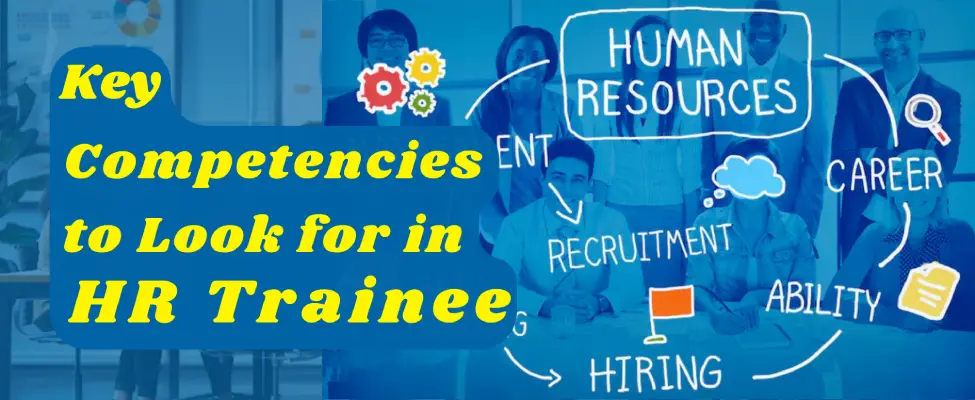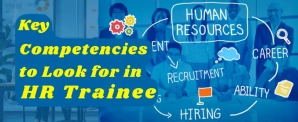
Reviewed by HR & Business Communication Experts Updated for 2026 Professional Communication Standards
Key Competencies to Look for in HR Trainees
Human Resource (HR) professionals are integral to the success of any organisation. They bring a blend of role-specific and soft skills, making sure organisational goals are met and legal compliance is maintained.
As a business owner, it can be a little challenging to hire an HR professional – you might feel overwhelmed or even confused, not knowing which skills to assess. If this sounds relatable, we’ve got you covered.
Key Competencies you Should Look for in an Human Resource Trainee:
1.Business Knowledge
While Human Resource trainees may be at the start of their careers, having a grasp of core business principles is a huge advantage. HR exists to support the wider goals of the organisation. A trainee with business knowledge or who has completed or shown an interest in business courses is likely to understand how people-related decisions affect productivity, profitability and overall company strategy.
This competency includes awareness of how different departments function, the importance of aligning workforce planning with business objectives, and an appreciation of financial considerations such as budgeting and cost control. For example, one of the objectives of recruitment is to find candidates whose skills contribute to long-term business growth. Similarly, when developing training programs, an HR professional should be able to tie learning outcomes to organisational performance.
A trainee with solid business acumen will be more effective in shaping HR initiatives that are practical, results-oriented and aligned with company strategy. When evaluating a candidate, ask questions that reveal whether they’ve made connections between people management and business outcomes. For instance, you might ask: “How do you think HR contributes to a company’s success?” or “What role do you think employee engagement plays in achieving business goals?”
2.Administrative Expertise
Administration is a huge part of the HR role. While a human resources trainee primarily assists the HR department and personnel, they still need to know administrative tasks. Assess the candidate’s education and past experience to make sure they can handle the following administrative tasks:
- Assistance with hiring and onboarding employees
- Maintaining employee records
- Updating employee information like contact details, department changes and attendance data
- Organising employee training and development
- Supporting payroll
- Tracking attendance
- Managing leaves
- Performance review documentation
Business administration isn’t all sunshine and rainbows. A candidate with extensive experience in administration, irrespective of the industry, deserves special consideration.
3.Effective Communication
Communication is the most frequently mentioned skill in job postings for HR professionals, and rightfully so. A significant part of their jobs revolves around communicating with stakeholders, management personnel, employees and candidates.
HR professionals are the most credible source of information for employees. They handle questions and complaints and effectively convey company policies to the employees. What’s more, they communicate with stakeholders and upper management at different levels of influence.
Spend considerable time assessing a candidate's communication skills. Ask them to explain a complex and relatively controversial idea. Or have them share an instance that required them to communicate with intention and care.
4.Active Listening
Another important skill you should look for in an HR trainee is active listening. A transparent work environment is a two-way street. HR professionals do more than just share company policies with employees. They attentively listen to employee concerns without prejudice or judgment, creating a safe space. Along with active listening, they practice empathy and make employees feel valued.
Active listening is especially important for resolving conflicts and handling grievances so every employee feels supported. Here are some ways you can assess a potential hire’s active listening skills:
- Use behavioural questions, rather than hypothetical scenarios. For instance, you can ask the candidate to describe a time when they had to listen carefully to an employee.
- Observe non-verbal cues. Try to assess how attentive a candidate is during the interview. Eye contact, nodding, smiling, leaning forward and mirroring your gestures are all signs.
- Consider peer evaluation. Reach out to other people, such as previous colleagues, who have interacted with the candidate, and get their opinions on their active listening skills.
5.Command on Technology
In today’s day and age, the workplace is highly digital. HR professionals must be proficient in using Human Resource Information Systems (HRIS), data analytics tools and cloud-based collaboration platforms.
A tech-savvy Human Resource trainee would be familiar with applicant tracking systems (ATS), payroll software and performance management tools. Alongside this, proficiency in Microsoft Excel and HR dashboards is a huge plus point.
Artificial intelligence (AI) has become a part of HR operations, especially recruitment. So don’t forget to assess a trainee’s willingness to learn new techniques and technologies. Lastly, consider the candidate’s knowledge of data privacy and cybersecurity best practices. This shows a responsible and informed approach to managing employee data.
Overall, a strong technological foundation enhances efficiency, accuracy and innovation in HR practices.
6.Knowledge of Employment Law and Compliance
HR professionals must have at least a foundational understanding of employment law, even as trainees. Employment regulations safeguard both the organisation and its employees, so trainees must show an awareness of key compliance areas. This includes workplace health and safety standards, anti-discrimination laws, wage and award conditions and fair dismissal procedures.
While you wouldn’t expect an Human Resource trainee to be a legal expert, they should demonstrate curiosity and a willingness to learn about compliance requirements. Their ability to recognise the importance of these frameworks ensures that the organisation avoids costly disputes and maintains a reputation for fairness and integrity. To assess this, ask candidates about situations where they had to follow specific rules or policies, even outside the role of HR – for example, in previous jobs or academic settings.
Wrapping Up
Selecting the right HR trainee involves identifying individuals who combine administrative expertise, strong communication, active listening, business knowledge and technological fluency with softer yet equally important qualities like problem-solving, relationship-building and adaptability.
By carefully assessing these skills in the hiring process, you’ll be better equipped to bring in capable, motivated trainees who will grow into trusted HR professionals and contribute to a supportive, legally compliant and forward-thinking workplace.
Author & Reviewer
This content is prepared and reviewed by HR and workplace communication professionals and is updated to reflect current professional Standards.
Latest JobsView All
-
Assessment Lead (English) @ De... New Delhi 17 Feb 2026 Ascent Human Solutions Pvt. Ltd..
-
Manager Quality... Gurgaon 13 Feb 2026 Ascent Human Solutions Pvt. Ltd..
-
Editorial Manager - English @ ... New Delhi 17 Feb 2026 Ascent Human Solutions Pvt. Ltd..
-
Marketing Manager @ Delhi... New Delhi 17 Feb 2026 Ascent Human Solutions Pvt. Ltd..



